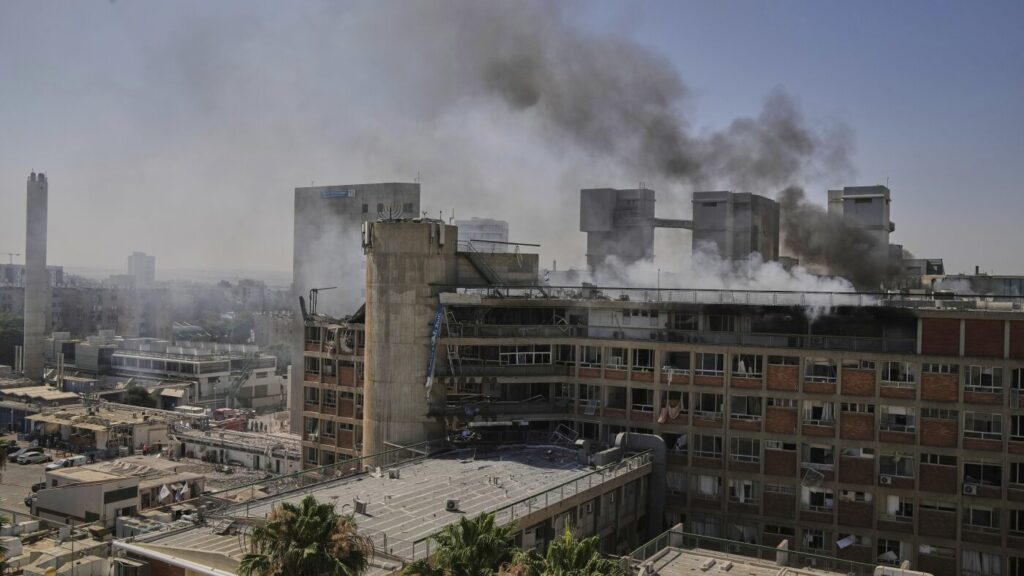
Smokes raises from a building of the Soroka hospital complex after it was hit by a missile fired from Iran in Be'er Sheva, Israel, Thursday, June 19, 2025. (AP Photo/Leo Correa)
BEERSHEBA, ISRAEL – In a dramatic escalation, Israel has vowed to intensify its military response after an Iranian missile struck a major hospital in the south of the country on Thursday. The attack has prompted sharp warnings from Israeli leaders, who have pledged to target “strategic sites” within Iran.
Immediate Impact
The Soroka Medical Center, the largest hospital in southern Israel, reported that several individuals were treated for minor injuries and shock following the missile strike. The hospital’s old surgical wing sustained extensive damage, though it had been evacuated days earlier as a precautionary measure. Videos circulating online depict shattered hospital rooms and thick black smoke billowing from the site.
Key Details Emerge
Iranian state media claimed the missile was intended for a nearby military target and denied any intention to hit the hospital. However, Israeli Prime Minister Benjamin Netanyahu condemned the attack, stating on X, “We will exact the full price from the tyrants in Tehran.”
Israeli Foreign Minister Israel Katz labeled the strike a war crime and promised accountability for Iran’s Supreme Leader, Ayatollah Ali Khamenei. “The cowardly Iranian dictator sits in the depths of a fortified bunker and fires aimed shots at hospitals and residential buildings,” Katz wrote on X.
By the Numbers
Since the conflict began, the Israeli military reports more than 400 rockets and hundreds of drones have been launched at Israeli territory. As of Wednesday morning, Israeli authorities reported 24 dead and 838 wounded, including 11 in serious condition.
Israel’s emergency services, Magen David Adom, noted that three people were in serious condition following Thursday’s blasts, with an additional 42 civilians injured by shrapnel or blasts.
Regional Implications
Israel’s retaliatory strikes on Iran have reportedly resulted in over 200 deaths, according to Iran’s Health Ministry. However, the Human Rights Activists News Agency, an independent group, claims the death toll is 639 based on non-governmental sources.
In a significant move, Israel targeted the Arak heavy water reactor, a critical component of Iran’s nuclear program, overnight into Thursday. This action follows Israel’s surprise attack initiated seven days ago, aimed at dismantling Iran’s nuclear capabilities.
Expert Analysis
Iranian Supreme Leader Khamenei warned that any U.S. military intervention could lead to “irreversible consequences.” He emphasized Iran’s resolve to resist what he termed an “imposed war” and an “imposed peace.”
Meanwhile, U.S. President Donald Trump declined to confirm whether the U.S. would join Israel in targeting Iran’s nuclear sites, stating, “You don’t seriously think I’m going to answer that question.”
What Comes Next
In an NPR interview, Israeli President Isaac Herzog expressed support for any measures that would eliminate Iran’s nuclear threat but emphasized that decisions regarding U.S. involvement rest with President Trump and his team.
The situation remains fluid, with both nations bracing for potential further escalations. The international community watches closely as tensions between Israel and Iran continue to mount, with possible implications for regional and global stability.
NPR’s Hadeel Al-Shalchi, Daniel Estrin, and Itay Stern contributed reporting from Tel Aviv.






